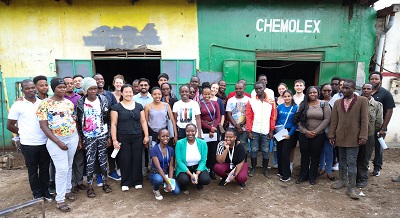
July 8, 2024, by aczht
MBA Student Climate Resiliency Challenge
Earlier this year, selected students from the University of Nottingham and KCA University in Kenya collaborated on a British Council-funded climate resilience challenge-based learning project in Kenya. The project, facilitated by Circle Innovation, saw students of all levels from both universities working together to design and pitch innovative interventions and prototypes to a challenge statement. This was set out by Chemolex, a fast-growing clean energy and waste management start-up based in Nairobi that aim to deliver impactful and sustainable solutions in waste management and renewable energy in developing countries.
 Waste management in Kenya has become a critical challenge due to population growth, rapid urbanisation, and inadequate resources and infrastructure to manage the waste produced. Over 20,000 tonnes of plastic waste is generated every month in Kenya and only around 10% is recycled. The country is experiencing serious waste collection, disposal and recycling challenges, resulting in environmental degradation, public health hazards and economic losses.
Waste management in Kenya has become a critical challenge due to population growth, rapid urbanisation, and inadequate resources and infrastructure to manage the waste produced. Over 20,000 tonnes of plastic waste is generated every month in Kenya and only around 10% is recycled. The country is experiencing serious waste collection, disposal and recycling challenges, resulting in environmental degradation, public health hazards and economic losses.
The climate resiliency challenge provided hands-on experience for students but also offered Chemolex fresh perspectives on solutions to the real-world economic challenges faced in Kenya. The project aimed to strengthen international partnerships and enhance global institutional collaborations, blending research and theoretical knowledge of University of Nottingham students with practical, local insights from KCA University.
Student challenge
The challenge set by Chemolex was how to reduce the water footprint of their recycling process. Students identified four key areas of opportunity to address the challenge statement:
- Improve aggregation of the plastic to create a more efficient system.
- Improve the production process to enable Chemolex to become better waste managers and climate change advocates.
- Optimise the process of production to reduce emissions and provide a safe working environment – while remaining profitable.
- Enable Chemolex operations to become more sustainable.
MBA student reflection – Venkata Madhu Babu Chilagapati
One of the selected Nottingham University Business School students, Venkata Madhu Babu Chilagapati, an MBA student with ten years of technical experience in aerospace engineering and propulsion systems, shares his experience in Kenya:
During my time at the Business School, I was introduced to sustainability in depth. My studies redefined and deepened my understanding of sustainability and the rate at which resources are being depleted. In particular, the necessity to adopt responsible consumption for the sake of future generations. As I was reflecting on the crucial link between sustainability, climate change and the urgency of resource conservation, I came across a climate resiliency challenge email, and I applied without hesitation.
Our focus was on reducing the water footprint of Chemolex and preventing microplastics from entering the ecosystem. While forming solutions posed a challenge, the structured problem-solving approach introduced during the project enabled us to develop an innovative design—a contactless heat exchanger that could eliminate water contamination by 100% and significantly reduce water consumption.
Collaborating with individuals with diverse perspectives within the group was challenging, but we used a democratic voting system that was not only fun, but also facilitated consensus-building. The experience was enjoyable and educational, fostering cultural exchanges and helping me to develop ever-lasting friendships with people from the other side of the equator.
How has my Kenya experience shaped my studies and career aspirations?
The insights gained from the challenge significantly influenced my approach to coursework, where I’m now more considerate of sustainability.
While sustainability wasn’t a significant focus before, it has now become central to my career goals. The concept of social enterprise deeply resonates with me, inspired by interactions with local communities in Kenya. I am committed to guiding my career path towards making a positive impact on those around me and fostering a sense of personal fulfilment and growth.
I aim to apply my skills towards carbon emission analysis and carbon footprint mapping within supply chain processes. My long-term aspirations involve using my mechanical engineering and design expertise to develop energy-efficient devices.
International Centre for Corporate Social Responsibility
To find out more about how Nottingham University Business School is helping to tackle sustainability challenges, visit the International Centre for Corporate Social Responsibility webpage here.
No comments yet, fill out a comment to be the first

Leave a Reply